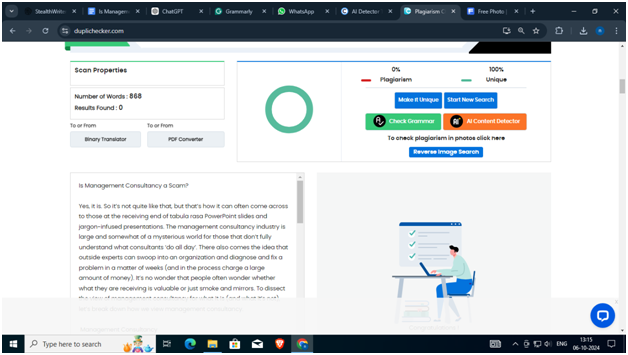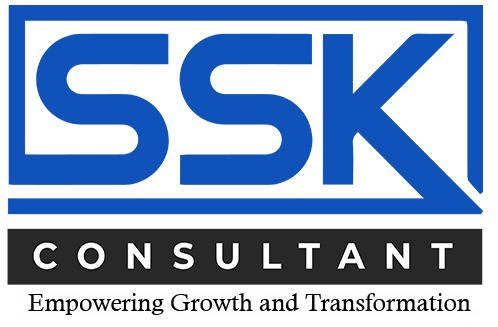Is Management Consultancy a Scam?

Yes, it is. So it’s not quite like that, but that’s how it can often come across to those at the receiving end of tabula rasa PowerPoint slides and jargon-infused presentations. The management consultancy industry is large and somewhat of a mysterious world for those that don’t fully understand what consultants ‘do all day’. There also comes the idea that outside experts can swoop into an organization and diagnose and fix a problem in a matter of weeks (and in the process charge a large amount of money). It’s no wonder that people often wonder whether what they are receiving is valuable or just smoke and mirrors. To dissect the view of management consultancy for what it is (and what it’s not), let’s break down how we view management consultancy.
Management Consultancy
Management consultancy is a scam, they say, because what do consultants actually do? The core of management consultancy is about offering business expert advice to enhance performance, strategy, operations, and overall competitiveness. Consultants are hired by companies to solve complex problems, implement new strategies, and drive transformation in their organization. However, the position of a consultant is sometimes separated from the job of the company. Unfortunately, consultants come in as outsiders, using frameworks and methodologies which maybe might not fit the unique culture or situation of the company they are trying to help. Moreover, most consulting firms have expensive fees, and therefore companies wonder if the results they deliver are worth it. Consultants are also often seen as those who produce pages of documents full of buzzwords, rather than delivering results that can be acted on. The perception that often exists as to whether or not it’s a ‘Scam’ is.
The perception that management consultancy is a scam stems from several key factors:
1. High Fees with Vague Deliverables:
Fees of consultants to management are very high. If you’re a small to mid-size company bringing on a large consultancy firm like McKinsey or BCG can cost millions. The thing that upsets some clients is that they’ll pay so much and often walk away with generic, template-based solutions rather than the individual, meaningful strategies that you’d expect for the price.
2. Ambiguity in Results:
Consultants are expected to provide a lot of reports and presentations, but the exact actionable benefits are not very clear. The presentations may look fancy, but the deliverables can be tricky to execute or worse, don’t fit with the reality of the company’s needs. One thing to do is to figure out what the problem is, but when it comes down to fixing it, that requires a level of understanding of how the company actually works — and that often comes with an inside knowledge that consultants might not have as outsiders.
3. Dependency Culture:
One reason the industry can feel scam-like is that sometimes it evolves from dependency. There is also an incentive for consulting firms to keep clients that need their services in the long term, resulting in long engagements and slower actual progress than may be needed. The conjecture here is that firms prefer to keep the revenue flowing by ramping up projects rather than accelerating toward a fast and inexpensive answer.
4. Lack of Accountability
Consultants, however, are not held accountable for long-term outcomes; rather, they leave after the engagement is over. Once their recommendations don’t work out in the long run, the consultants are now out the door and the company has very little recourse.
But Is It a Scam?
Yet, to brand management consultancy a 'scam' — which many have — is simplistic. Many consultants do provide tremendous value as long as they’re managed properly by the client. Several factors indicate that a communicated and organized consultancy may indeed create real benefits for organizations.

1. Fresh Perspectives: An outside point of view is something that consultants can bring which can be invaluable. However, when you have been working on a specific process for so many years, it’s very easy to already be embedded in it. An internal employee may be so close to the problem that they simply ignore the areas where improvement is needed, but a good consultant can readily pick these areas out.
2. Specialized Expertise: With experience ranging from decades of practice to extremely specialized knowledge in a particular field, such as organizational transformation, digital strategy, or supply chain optimization, management consultants often have a lot to offer. Because of their expertise, they can introduce best practices and new ideas that companies may not have internally.
3. Objective Decision-Making:At times internal teams can be biased or may have a conflict of interest that keeps them from taking an objective approach. A third-party, neutral point of view is an advantage that consultants can provide to help steer a strategic decision without the politically charged baggage of 'inside the company.
4. Results-Oriented: There's no shortage of consultancies that offer performance-based pricing models, they only get paid for the results they deliver. This allows the incentive of the company and the incentive of the consultancy to be aligned so that consultants have an incentive to make actual, tangible change.
Value from Your Consultants: How Companies Can Make Sure They Get Ita>
And for companies thinking about hiring management consultants, there are ways to limit the risk and make sure they get real value. Here are a few tips:
1. Be Clear on Expectations:
If you're thinking of entering into a consultancy relationship then proper goals and expectations need to be determined first. That translates to having clarity on what the scope of the work will be and exactly what you expect the consultants to deliver at the end of the day. Vague goals don’t lead anywhere but to very fuzzy deliverables.
2. Choose the Right Firm for your Needs:
All consultants aren't the same. Other firms specialize in particular industries or kinds of projects. I think it’s really important to choose a firm that’s going to cater to your specific needs, not just the big name.
3. Hold Consultants Accountable:
Make sure the consultant structure has accountability built in, for delivering measurable results. A few firms are willing to consider performance-based contracts that guarantee you only pay for what you get.
4. Ensure Knowledge Transfer: The main complaint companies have is that when consultants leave they leave without transferring their knowledge to the internal team. Be sure to ensure the consultants are providing or creating training that enables your team to pick up where they left off when the engagement concludes.
Management consultancy is often seen as a scam, and it’s not difficult to understand why that would be, but it doesn’t have to be. Consultants have their faults, but reading them doesn’t mean you discount their usefulness. To get the most out of a consultancy engagement you should go in with clear expectations, choose the right partner, and ensure the solutions they give you are actionable and sustainable. When it is used in that way, management consultancy is less of a ‘scam’ and more of a how-to to drive business success.



